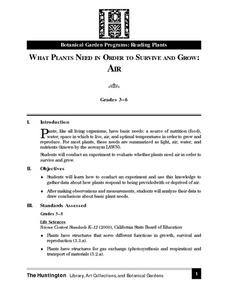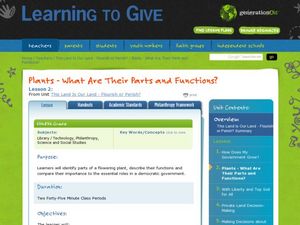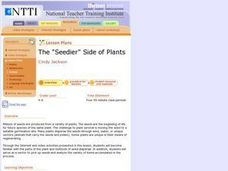Chicago Botanic Garden
Unit 3 Pre-Test, Grades 7–9
Earth's systems respond to changes in environments in all types of ways including migration, extinction, adaptation, immigration, and emigration to name a few. Part one in a series of seven is a pre-test consisting of 14 questions. Some...
Curated OER
Life Cycle of Trees
Turn your students into young tree-tectives with this fun science investigation into the life of trees. To begin, a class volunteer gets dressed up in a tree costume as the different parts of trees are introduced. Then, the class learns...
Carnegie Mellon University
Transportation
Teach your environmental studies, life science, or engineering class how an internal combustion engine works using the first few slides of the accompanying presentation. Then, focus in on the resulting carbon emissions. Finally, take a...
Curated OER
Plants, Ecology, Seed Planting
First graders use senses to examine objective or events, then gather and interpret data with instruments. They design invention to support or refute hypothesis, then generate, record, and organize data. They improve environmental...
Curated OER
What Plants Need in Order to Survive and Grow: Air
Students conduct an experiment to determine whether plants need air in order to survive and grow. They discuss natural resources, analyze slides, and observe and record data from the experiment.
Curated OER
Growing plants
Students explore plants and recognize that they are living things that require light and water to grow; students identify, name and match the parts of plants.
Curated OER
Make your Garden Grow
Fourth graders role play as certified horticulturists as they study the biology of plants and gardening. They design a garden for their school based on what they researched and a given budget.
Curated OER
The Amazing Tomato
Learners gain an understanding of where our food comes from. In this plant life lesson, students review what plants need for growth and how long it takes them to grow. Learners research which plants it takes to make salsa. Students then...
Curated OER
PLANT LIFE CYCLES
Student learns about the life cycle of plants by watching a time-lapse video. This activity provides students with further evidence that all living things grow and change as they progress through their life cycle. Student conducts a...
Curated OER
How We See Things
Students investigate how mirrors reflect light. In this reflection lesson, students draw the path of the light reflected from a mirror. Students construct a list of objects that are light sources.
Curated OER
Biology: Plants - The Fiber of Life
Learners, in groups, examine and list the varieties of plants and how they relate to man and the environment. They create plant books complete with leaf samples with sketches and information, grow beans in plastic baggies, and role-play...
Curated OER
Botany: How does the rice plant grow in water?
Second graders read about how rice grows in water and make a rainstick when they are done. In this rice lesson plan, 2nd graders make a rain stick out of rice, posterboard, scissors, glue, and a cardboard tube.
Curated OER
Native Plants: An Outdoor Scavenger Hunt
Young scholars recognize various California native species by their physical appearances and characteristics. They recognize the adaptations that plants make to their surroundings and how humans make use of plants.
Curated OER
How do rice farmers make good use of the land they use for planting rice?
Second graders discuss how farmers grow rice. In this rice growing lesson, 2nd graders see the optimal condition for land in order to grow rice. They experiment with clay and garden soil to see which holds water better.
Curated OER
Plants- What Are Their Parts and Functions?
Students learn about plants. For this plant function lesson, students label the parts of a plant and their functions. Students work in small groups to create three simile statements to relate to the function of essential plant parts....
Curated OER
How Do Green Plants Grow?
Students explore how seeds grow. They design an experiment and predict its outcome.
University of Minnesota
Mirroring Emotions
Do you ever give your class the "teacher look"? Without saying a word, they become silent and engaged (hopefully). How do they know what you're thinking? Explore the concept of nonverbal communication and how it relates to our mirror...
Curated OER
What Plants Need in Order to Survive and Grow: Soil
Students conduct an experiment to evaluate whether plants need soil to survive and grow. They plant two seeds, one with soil and one without, make predictions, and record and analyze the seed germination results on a worksheet.
Curated OER
Dry-Land Kalo-Growing New Plants from Stems
Students explore Hawaiian plants. In this Hawaii culture and botany instructional activity, students plant the haha(stem) of a taro plant. Students listen to Hawaiian myths about the taro plant and chorally speak a Hawaiian chant of...
Curated OER
Proteins from Plants to People
Students participate in a scientific activity to identify the building blocks for proteins (amino acids) that are needed to grow. They identify foods that contain proteins, how they are digested and rearrange the building blocks. They...
Curated OER
Meet the Plants
Learners examine the difference between living and non-living things. In this living versus non-living lesson, students complete a KWL worksheet and a Living and Non-Living Chart. They examine a variety of plants and non-plants before...
Curated OER
Got Plants
Second graders discover that all living things need food in order to live. In groups, they examine the interconnectedness between animals and plants. They identify which animals eat plants to survive and which animals eat animals that...
Curated OER
The "Seedier" Side of Plants
Students demonstrate seed dispersal vectors through role-play, analyze seed types, identify plant parts, list seven conditions plants need in order to grow, and describe how seeds travel.
Curated OER
Plants And Pollination
Students describe sexual reproduction in plants, including the process of pollination, how insects assist in pollination, and how pollination differs from fertilization. They also explore the importance of honey bees to Arizona agriculture.

























